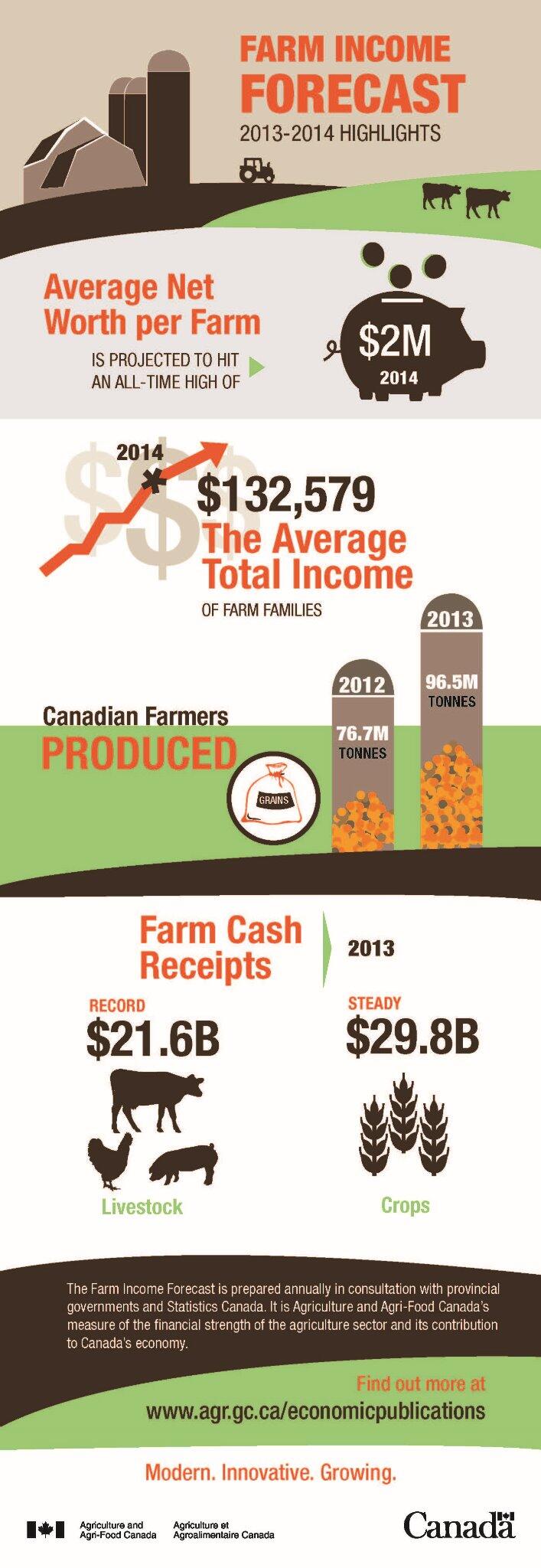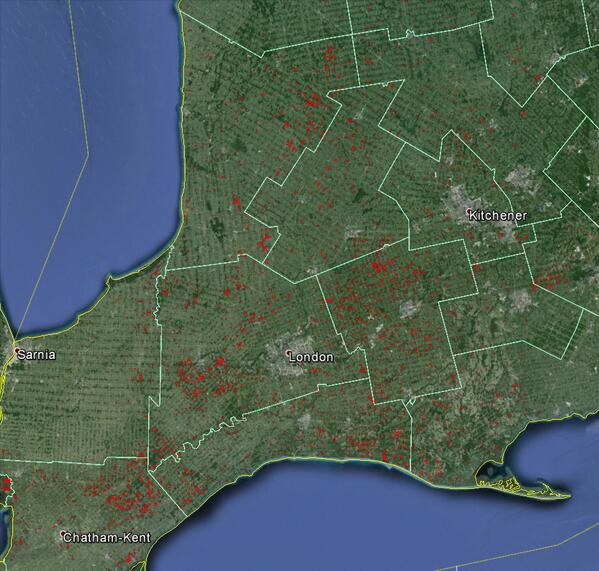February 2014 Blog Posts (11)
 Infographic: Growth of Technology
Infographic: Growth of Technology
Added by OntAG Admin on February 25, 2014 at 3:30am — No Comments
 Infographic: Canadian Farm Income Forecast Highlights 2013-2014
Infographic: Canadian Farm Income Forecast Highlights 2013-2014

Added by OntAG Admin on February 19, 2014 at 12:30pm — No Comments
 Trish Jordan Blog: Sochi 2014 – Farewell to Sochi
Trish Jordan Blog: Sochi 2014 – Farewell to Sochi
Added by OntAG Admin on February 18, 2014 at 8:19am — 1 Comment
 Trish Jordan Blog: Sochi 2014 – A Day Off in Russia
Trish Jordan Blog: Sochi 2014 – A Day Off in Russia
By Trish Jordan, Public & Industry Affairs Director, Monsanto Canada
After a busy last couple of days in my 2014 Olympic Winter Games experience in Sochi, Russia, I was finally able to sleep in on Friday morning as the women’s Canadian curling team had a bye. Happy belated Valentine’s Day everyone!
It was great not to have to be down in the lobby of our hotel at our usual 7:30 am departure time. With…
ContinueAdded by OntAG Admin on February 16, 2014 at 10:12am — 1 Comment
 Trish Jordan Blog: Sochi 2014 – Canada Olympic House Lows and Highs
Trish Jordan Blog: Sochi 2014 – Canada Olympic House Lows and Highs
Added by OntAG Admin on February 15, 2014 at 3:30am — 1 Comment
 Trish Jordan (Monsanto Canada) Blog: Sochi 2014 – The Adventure Continues
Trish Jordan (Monsanto Canada) Blog: Sochi 2014 – The Adventure Continues
Added by OntAG Admin on February 12, 2014 at 9:30am — 1 Comment
 3-yr rotations. S. Ont. producers who grew corn '11, soybean '12, & wheat '13 (from AAFC crop map
3-yr rotations. S. Ont. producers who grew corn '11, soybean '12, & wheat '13 (from AAFC crop map
Another Agriculture and Agrifood satellite map thanks to Leander Campbell.
3-yr rotations. S. Ont. producers who grew corn '11, soybean '12, & wheat '13 (from AAFC crop maps) 
Added by OntAG Admin on February 11, 2014 at 10:00am — No Comments
 Who loves corn? These producers probably do! S. Ont. fields that grew corn in '11, '12 & '13
Who loves corn? These producers probably do! S. Ont. fields that grew corn in '11, '12 & '13
Another Agriculture and Agrifood satellite map thanks to Leander Campbell.
Who loves corn? These producers probably do! S. Ont. fields that grew corn in '11, '12 & '13. (AAFC crop maps) …
Added by OntAG Admin on February 11, 2014 at 9:12am — No Comments
 Trish Jordan (Monsanto Canada) Blog: Sochi 2014 – Full of Surprises on Day One
Trish Jordan (Monsanto Canada) Blog: Sochi 2014 – Full of Surprises on Day One
Added by OntAG Admin on February 10, 2014 at 2:30pm — 2 Comments
 FCC Video: Meet Hayley Wickenheiser, A Champion On And Off The Ice.
FCC Video: Meet Hayley Wickenheiser, A Champion On And Off The Ice.
Added by OntAG Admin on February 7, 2014 at 1:30pm — No Comments
 Dr. Gord Surgeoner Named to the Ontario Agriculture Hall of Fame
Dr. Gord Surgeoner Named to the Ontario Agriculture Hall of Fame
Gord Surgeoner, widely known for his significant contributions over a long and varied career as a scientist, educator and agri-food booster in biotechnology and cutting-edge manufacturing, is about to be inducted into the Ontario Agricultural Hall of Fame in Milton.
The Fergus native said Wednesday he felt honoured, highly appreciated the recognition, but was "humbled, too" because of the illustrious inductees that have preceded him.…
Added by OntAG Admin on February 6, 2014 at 12:15pm — No Comments
Featured Blog Posts
- When things don’t go according to plan
- The trip begins
- "GOOD MORNING VIETNAM!!!!!"
- Why do we not STRIP TILL every acre of corn?
- Farm clients important part of OVC teaching programs
- Ontario Premier Kathleen Wynne Addresses Advancing Women In Agriculture Conference in Toronto.
- Oxford Agricultural Awards of Excellence (best time of the year)
Latest Blog Posts
- Visiting a citrus cooperative
- Picking strawberries in January
- Exploring traditional and modern agriculture in Spain
- Ag and city tours make up our first few days in Spain
- AALP Class 17 leaves for Spain
- Using UAVs and the Crop Imagery Data they Collect to Improve Crop Yields and Performance
- How to Use Precision Agriculture Data - Veritas Farm Management & Deveron UAS.
Most Popular Blog Posts
- Exploring traditional and modern agriculture in Spain
- Picking strawberries in January
- How to Use Precision Agriculture Data - Veritas Farm Management & Deveron UAS.
- Telling our story in Plano
- Going back in time in Dallas
- AALP Class 17 continues with their leadership journey at Seminar 3 in Sarnia
- AALP Class 17 begins their leadership journey
Monthly Archives
2020
- January (5)
2019
- May (3)
2018
2017
2016
- December (4)
- November (1)
- October (9)
- August (5)
- July (13)
- June (3)
- May (2)
- April (3)
- March (2)
- February (2)
- January (3)
2015
- December (1)
- November (1)
- October (3)
- September (3)
- August (2)
- July (7)
- June (7)
- May (7)
- April (8)
- March (14)
- February (25)
- January (7)
2014
- December (10)
- November (18)
- October (21)
- September (10)
- August (8)
- July (31)
- June (21)
- May (10)
- April (6)
- March (16)
- February (12)
- January (11)
2013
- December (3)
- November (5)
- October (5)
- September (4)
- August (6)
- July (11)
- June (6)
- May (5)
- April (16)
- March (22)
- February (23)
- January (14)
2012
- December (18)
- November (6)
- October (8)
- September (12)
- August (9)
- July (27)
- June (12)
- May (19)
- April (8)
- March (14)
- February (13)
- January (15)
2011
- December (15)
- November (7)
- October (9)
- September (10)
- August (6)
- July (8)
- June (7)
- May (10)
- April (8)
- March (11)
- February (13)
- January (7)
2010
- December (10)
- November (7)
- October (11)
- September (11)
- August (4)
- July (16)
- June (4)
- May (10)
- April (4)
- March (6)
- February (6)
- January (7)
2009
© 2024 Created by Darren Marsland.
Powered by
![]()



